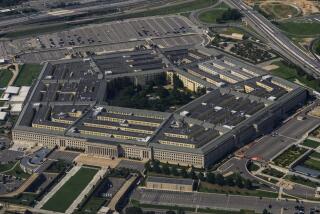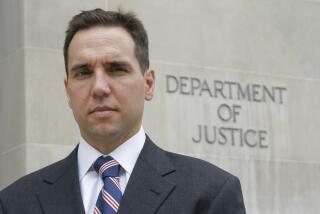Walsh Urges Restoring Special Counsel Law
- Share via
WASHINGTON — Iran-Contra independent counsel Lawrence E. Walsh, firing back at Republican critics who have charged that he has tried to “criminalize” policy disputes between the President and Congress, argued Tuesday for restoring the law under which he was appointed.
Prosecuting officials who lie to congressional committees is not “criminalizing” policy disputes, as critics have charged, because lying to Congress is a crime, Walsh said.
Speaking in Boston to the American Bar Assn., Walsh also for the first time publicly detailed his theory of the origins of the Iran-Contra scandal, in which U.S. arms were sold to Iran and the proceeds were used to aid the Contras in Nicaragua.
Walsh called for the restoration of the law authorizing the appointment of independent counsels because often, he suggested, only a prosecutor free of ties to the President or executive branch can prosecute cases involving high-ranking government officials.
Edwin Meese III, former President Ronald Reagan’s attorney general, had advised Reagan that he was not required to notify Congress about the sale of U.S. arms to Iran, Walsh said.
“Regardless of whether (Meese’s) advice was correct or incorrect,” Walsh said, “he is hardly in a position to investigate and prosecute those who followed it. Nor is it realistic to believe that the Department of Justice at any level can undertake this responsibility. Its loyalty to the President and to the attorney general would deny it credibility.”
Congress allowed the independent counsel law to lapse in December, 14 years after the bar group played a major role in winning its approval.
In tracing his view of the beginnings of Iran-Contra, Walsh said that the scandal sprang from Reagan’s loss of congressional support for funding the Nicaraguan rebels.
In 1983, Walsh said, Reagan anticipated that Congress would bar the use of federal intelligence funds to support the Contras and told his national security advisers to keep the rebels together “body and soul,” but not to violate the law.
Marine Lt. Col. Oliver L. North, who was a White House National Security Council aide, was assigned by Reagan’s two national security advisers--Robert C. McFarlane and his successor, John M. Poindexter--to carry out Reagan’s instructions, Walsh said.
An interdepartmental committee, known as the Restricted Interagency Group, “acted as a sort of board of directors and received regular reports from North” on some of his activities, Walsh said.
An “inner group of three (interagency members) discussed in more detail North’s activities,” he said. An aide to Walsh said that the inner group consisted of former Assistant Secretary of State Elliott Abrams, who pleaded guilty to misdemeanors in the scandal and who has denied existence of such a unit, Alan D. Fiers Jr., a former CIA Latin American task force chief who pleaded guilty to misleading Congress, and North, whose convictions were overturned on appeal. “There was substantial interdepartmental support for North,” Walsh said.
Reagan and his national security advisers knew North was the “point man” but “largely insulated themselves from direct contact with North’s impressive Contra-resupply effort,” Walsh said.
At the same time, a separate NSC operation was conducted to carry out Reagan’s desire to free U.S. hostages held by a radical Islamic group in Lebanon. Despite a declared national policy against trading with terrorists, Reagan was determined to win the hostages’ freedom even at the cost of trading arms with Iran, Walsh said.
More to Read
Get the L.A. Times Politics newsletter
Deeply reported insights into legislation, politics and policy from Sacramento, Washington and beyond. In your inbox twice per week.
You may occasionally receive promotional content from the Los Angeles Times.










